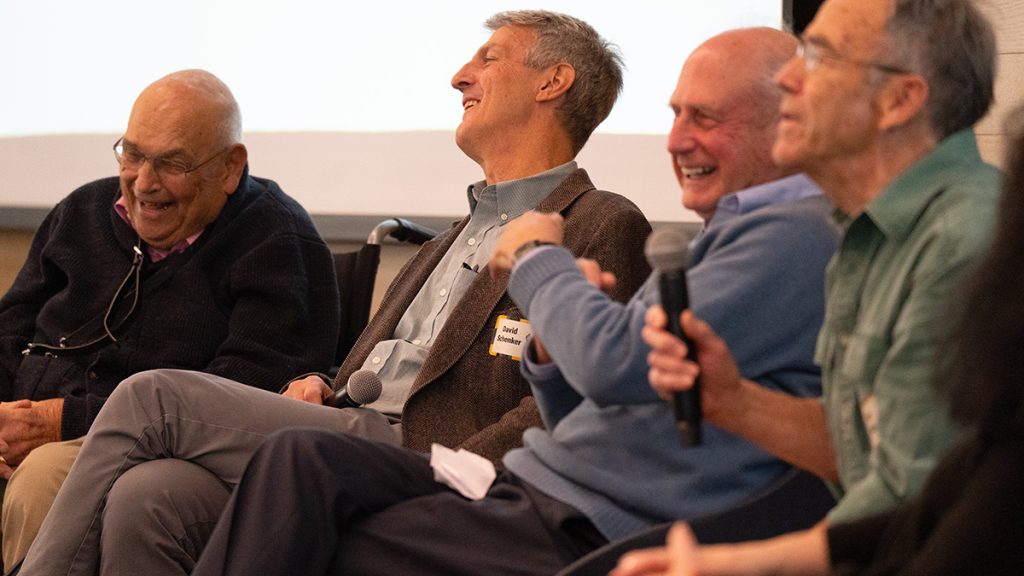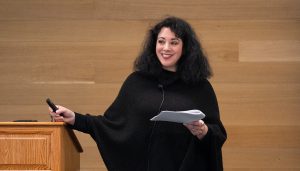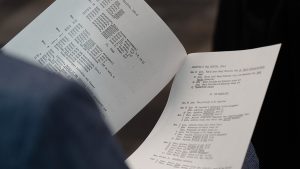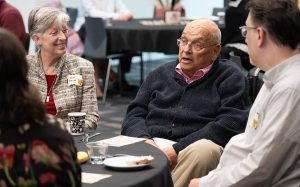
Story and photography by Logan Jackson
“Find the fun without sacrificing complexity.”
Throughout her nearly 30 years as a professor in the Humanities Sequence, Rachel Harper has made it a priority to create a learning environment that allows students to gain a deeper appreciation for the world around them. Through discussions on literature, philosophy, art, history, religion and music, students are introduced to the big ideas, questions and debates of the Western tradition. Harper, along with the other outstanding faculty across the University of Missouri campus, have led those conversations, aiding students in their efforts to make sense of the world.
The Humanities Sequence consists of four courses and has been engaging students since 1954, making it one of the University of Missouri’s oldest offerings. Those current course offerings are:
- Epic Destinies, Individual Journeys
- Exploring the art, literature and philosophy of the Ancient Mediterranean World, this course takes students from the fall of Troy to the flowering of art, poetry and magic throughout the Roman Empire.
- Here Be Monsters
- Exploring the art, literature, music and philosophy of the Medieval and Renaissance periods, this course opens in North Africa during the late Roman Empire on the threshold between the classical and medieval eras, and it closes in Shakespeare’s London during the English Renaissance.
- Reasonable Devils and Dark Visions
- Exploring the art, literature, music and philosophy of the Early Modern World, this course takes students from the delirious hills of La Mancha in 17th century Spain to the second-floor bedroom of 208 Main Street in Amherst, Massachusetts.
- Diagnosing the Dark
- Exploring the art, literature, music and philosophy of the Modern Era, this course focuses on artists and thinkers who have responded to the defining phenomena, events and crises of the last 150 years, including urbanization, industrialism, gender and racial discrimination, colonialism, war, the Holocaust, AIDS, and the prospect of Artifical Intelligence.

Harper, who is an associate dean in the Honors College and associate teaching professor of English, has been teaching in the sequence since 1998, just a couple years after her teaching career at Mizzou began. While Harper admitted that those earlier semesters were difficult at times, she was thankful for the guidance that other faculty offered.
“It felt like I was honestly just one step ahead of the students,” Harper said. “Everyone was so generous, though. I learned a ton. There were so many great people teaching in the sequence, and I was like a sponge. I also learned early on that there are two types of content – the content you’re teaching and then how you teach that kind of content. As I got more involved, I really honed in on what I wanted my students to understand and what the best ways were to get them to dig into the material. I wanted the students to find the fun and deeply engage with the material. But I also didn’t want them to overlook the complexity and influence of the works we were studying.”
Harper soon developed a deep passion for the sequence and was chosen as the coordinator in 2013. The coordinator role is a vital one in many different ways, especially when it comes finding faculty to lecture and teach within the sequence. Harper also builds out the main syllabus each semester, providing a deeper look at the material that students will be engaging with.
“I am always on the lookout for faculty to join us,” Harper said. “There is a lot that goes into it, and I’ve been so appreciative of the goodwill from department chairs and the willingness of faculty to take on extra work. The Honors College has definitely relied on a stable of adjunct and retired faculty, as well as our regulars. It can be challenging for sure, which is why I’m always on the hunt for additional professors. But it’s exciting, too, when you find that faculty who ends up falling in love with the work.”
When Harper was named coordinator, she joined a long line of women who have directed the work. Vera Townsend (art history) was one of the earliest coordinators of the sequence. Sue Crowley (religious studies) and Julie Melnyk (English) followed before Harper took the reins.
“It’s just a gift,” Harper said. “It’s an honor to build on the important work they did. It took so much effort to get the sequence to where it is now, and I’m proud to be part of it.”
The origins of the Humanities Sequence at Mizzou can be traced back to 1948. Elmer Ellis, the dean of the College of Arts and Science at the time, created three subcommittees to dive deeper into the general education requirements of the college. Charles M. Hudson, who was teaching in the English department, led one of those subcommittees, focused on humanities. In their final report, the group recommended that a general humanities course should be developed.
Over the course of the next two years, the committee researched existing programs related to the humanities. Two faculty even received Ford Foundation grants to get a first-hand look at how other universities were conducting interdisciplinary humanities courses. While one professor visited several colleges, spending a few weeks at each, Hudson decided to spend a semester at Columbia University and a semester at the University of Florida. He taught in their respective humanities programs to gain a better understanding of what an MU course could look like. Hudson would eventually be credited with founding the Humanities Sequence at Mizzou.

“That next year, the committee proposed a new general humanities course that would be taught by faculty from multiple departments and in the tradition of the great books, great ideas courses so popular at the time,” Harper said. “Pilot humanities courses were offered starting in 1953 with only four faculty – Anna Benjamin from classics, Donald Hodges from philosophy, Hobart Williams from English and Hudson.
“The structure of that first course was, essentially, the same as it is today, although the reading list, pedagogy and breadth have changed a great deal. All the sections met to hear lectures by experts in the field and then they split off into their smaller faculty-led discussion sections. The pilot courses, as you can guess, were successful and beginning in 1954 have been offered every semester at the University of Missouri.”
Faculty from numerous departments have lent their expertise to the sequence. The interdisciplinary nature of the courses has allowed for professors to interact with individuals in other fields, opening the door for meaningful conversations across subjects.
“One of the best things about the sequence was it introduced me to a whole bunch of new colleagues from all over campus, and we just had a lovely time together,” said Bill Bondeson, a Curators’ Teaching Professor Emeritus of philosophy. “We all loved to teach, and it was exciting to gather around and talk about these texts and art and music.”
Bondeson began teaching in the sequence in 1964 – his first semester as a professor at Mizzou. It was actually Hudson who recruited Bondeson to the sequence.
“I definitely learned as I went along in the course,” Bondeson said. “I was always learning. It was very rewarding to be part of such an exciting environment.”
Bondeson lectured in every semester of the sequence until his retirement in 2011 – speaking to the joy that being part of the sequence provided. Bondeson is hardly alone in that respect. Professors like Ted Tarkow, Peter Markie, Stu Palonsky and David Schenker spent a large of portions of their careers dedicated to teaching in the Humanities Sequence.
“The professor’s life is strange,” said Palonsky, a professor emeritus of learning, teaching and curriculum. Palonsky was also a long-time director of the Honors College. “It can be a lonely life. You often do your research alone, and no one really knows how well or how poorly you’re teaching. The Humanities Sequence brings that sense of community. We sit around one another for impactful discussions, and it really breaks up the loneliness. It allows you to share your approach to the books and ideas and get advice from other experts about their approach. There was nothing better.”
Those relationships strengthened when brown bag lunches were introduced after each lecture. Those interactions allowed faculty to ask in-depth questions of each other and the week’s lecturer and gather advice on certain texts or materials. It also allowed them to add colleagues from outside of their departments.

“I learned a lot about teaching from teaching in the Humanities Sequence,” said Markie, a Chancellor’s Professor and Curators’ Distinguished Teaching Professor Emeritus of philosophy. “It was incredible to watch these great professors in the classroom and see their lecturing styles. As a professor, it’s oftentimes rare to see other professors lecture. That’s what makes the Humanities Sequence so special. It was a joy to see my colleagues in front of the class. I definitely did my best to pick up on what they were doing, especially when it came to the content. It was always inspiring.”
While interacting with other faculty has continued to be a bright spot for professors in the sequence, working with Honors College students across campus has also been a highlight. Students come from all walks of life – and degree programs – and bring different perspectives to the discussions.
“We really do get work with some incredible students,” said Tarkow, a professor emeritus of classical studies who is still active within the sequence. “The best thing is that those relationships last well beyond their time at Mizzou. I’m still in touch with so many students, and I’m appreciative of that bond.”
Students certainly feel that bond, too. They continuously praise the sequence and the faculty who make it so great. A prime example came during the 70th anniversary celebration. Many students returned to Columbia to discuss its impact on their current lives.
“The Humanities Sequence was by far the most beneficial thing I did as an undergraduate student,” said Jack Stiens, who earned degrees in economics and political science from Mizzou in 2023. Stiens is currently in the Mizzou School of Law, continuing his education. “As we repeated often, humanities is everywhere. I appreciated the range of lectures, topics, discussions and perspectives I got to experience in each course. Additionally, I really valued being able to see my own ‘heroic journey’ as I took the first two courses in my freshman year and finished the sequence in my senior year. The change in the quality of thought, perspective and appreciation I had for the Humanities Sequence grew over the course of undergrad, and I will forever value the lessons I learned.”
Throughout its 70 years of existence, the Humanities Sequence has provided an important journey for faculty and students alike. It’s been important for everyone involved to understand that the journey isn’t to be taken alone, either. As the sequence continues to ask big questions, the bond that is shared goes well beyond the classroom.
“In general, the humanities are sold to people because it will help them think bigger, read better and make them more employable,” Bondeson said. “And that is all absolutely true. There is a non-vocational part of this sequence that is very important, too. We’re helping people lead better and more enriching lives. We don’t emphasize it enough, honestly. Being part of the Humanities Sequence was a grand time. It’s just terrific.”